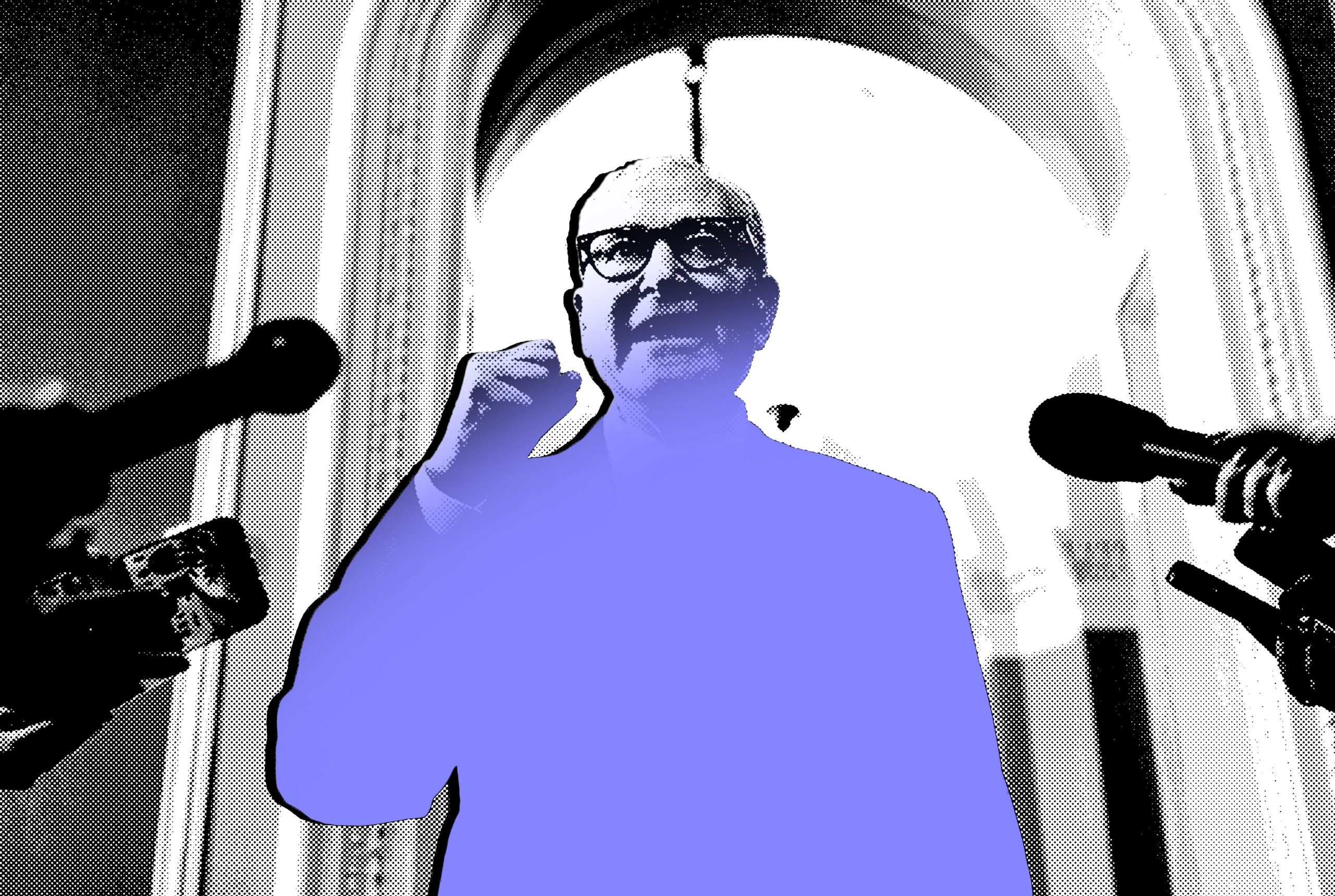Ever since he helped avert a government shutdown in March—citing WIRED’s reporting on Elon Musk’s desire for one as part of his rationale—Senate minority leader Chuck Schumer has been waiting for this moment to redeem himself.
The problem is that Schumer may have already blown his chance. With a government shutdown now here, frustrations over Schumer’s leadership have been bubbling up behind the scenes as the party begins to look toward a post-Schumer era.
“It’s a foregone conclusion that he will not be leader,” a senior Democratic strategist tells me, requesting anonymity to discuss candid conversations with their colleagues. “Most people think he will not be leader in a year and a half’s time.” This would be after the 2026 midterms, with a new Congress in place and some key retirements among Schumer allies, such as Senator Dick Durbin of Illinois. But the last shutdown fight is still reopening old wounds.
They add that by averting a shutdown in March “in exchange for literally nothing, he delivered the president a budget.”
Schumer’s standing among Senate candidates in competitive races is “the worst it’s ever been,” a Democratic campaign consultant with clients running for Senate tells me. Schumer’s average approval rating is worse than Donald Trump’s, hovering in the mid-20s, according to an average of the polls estimated by RealClearPolitics. This year, for the first time in YouGov’s polling on Schumer going back to 2019, he’s dipped below 50 percent approval, twice, among Democrats nationwide.
The same qualities that made Schumer a beloved local politician and a historically popular statewide politician in New York—where he maintained strong relationships with colleagues and was sure to visit all 62 New York counties each year—have worked against him as a party leader in a time when he needs to make tough decisions that won’t make everyone happy.
“Schumer’s overriding quality as a leader is, he doesn’t like being criticized,” a senior Senate aide says. When asked if Schumer has done anything since March to show any improvement in his ability to strategize and communicate better in Trump 2.0, this source took a beat. “Um, no.”
Adam Jentleson, the founder and president of the anti-think-tank think tank the Searchlight Institute, has a lot of familiarity with the struggles facing a minority leader after his time working as deputy chief of staff for the late Senator Harry Reid.
“These jobs are tricky, because the skills that it takes to rise to the top as a caucus leader are not the same type of skills that translate to being a good public communicator,” says Jentleson of Schumer’s tenure and current issues in the role. “But we’re entering an age where the public communication side of things is more and more important. And that’s been a real struggle for him.”
And the vibes simply are not on Schumer’s side.
“It’s not like a Biden thing,” the Senate aide tells me, noting that colleagues believe Schumer is still “sharp,” if not adroit in his communication skills compared to his glory days. “But his instincts were formed in a different time in Washington, and he hasn’t been super quick to adapt.”
“A big part of this is generational,” says Jentleson.
Over the past week, Democratic sources I spoke with told me they were hoping Schumer would shut the government down to focus the discussion on key issues, such as health care subsidies and President Donald Trump’s governmental overreach. When the clock struck midnight on Wednesday, he did just that.
But what became most clear is that for many inside the party, the post-Schumer era has already begun. My sources say Senator Brian Schatz of Hawaii has emerged as the clear successor to Schumer, and he is seen by insiders as best positioned to get the necessary votes in his conference. There is also speculation within the party over whether Representative Alexandria Ocasio-Cortez of New York will challenge Schumer in a primary when he’s up for reelection in 2028, should she decide not to run for president. Representatives for Schatz and Ocasio-Cortez did not respond to requests for comment.
“What he has been is a very good majority leader. What we need right now is a very good minority leader,” the strategist says. “He is still treating the Senate like it’s, I don’t even know how to put it, pre-second-term Obama?”
A Hard Day’s Night
This isn’t exclusively, or even mainly, about Schumer’s age, even if aging Democratic politicians have been on everyone’s minds as of late. (“Some of this is just transference,” the Senate aide tells me. “People are mad about old people in power, and Schumer is the closest target.”) On the campaign trail, the main frustration with the notorious flip-phone enthusiast has been more about his struggles to appear as a fighter.
“Go watch MSNBC for an hour,” says the campaign consultant. “All people want is: ‘I am fighting, and here’s how.’”
Team Chuck sees it differently. Barney Frank, the former Massachusetts congressman, tells me Schumer’s tenure as minority leader has gone “as well as it could have been,” and that he thinks “generational politics is bullshit.”
“It’s always easier from the outside,” Frank says. “Now, the other criticism is, well, why can’t the Democrats get together on one message? And the answer is: in America, institutionally, when you’re the party out of power, you don’t have the presidency, you don’t have a spokesperson.”
But voters and other Democrats have found Schumer’s message lacking.
The most dangerous place in Washington, strategists used to say, was between Chuck Schumer and a camera. Same goes for his Albany days. Schumer’s innovation in his early years was holding press conferences on Sunday mornings when there was little competition. As media competition has exploded, that strategy, my sources tell me, no longer works. Schumer’s forays into more contemporary media, like vertical video, have also been uninspiring at best.
While more pugnacious Democrats have arrived on the scene already fluent in the modern attention economy, Schumer’s “leadership style is stuck in the ’90s and early 2000s,” says the Democratic strategist. “Raising money and being quoted in the press is not enough anymore.”
The strategist and the Senate aide each say that inside discussions have largely focused on two possibilities: A potential primary challenge from Ocasio-Cortez and a dignified exit that involves declining to run for reelection. (Schumer’s office did not answer a question on his plans for reelection.)
“His career is not gonna end by being successfully primaried by AOC,” the Senate aide says. “He is still a savvy operator. He can absolutely, I believe, box AOC in, and she’s not going to want to run and lose.”
Schumer declining to run for reelection, both of these sources predict, seems to them as the most likely way this ends. A well-timed announcement would come after the 2026 midterms, giving Democrats plenty of time for a new leader to settle in ahead of 2028.
How Schumer’s succession plays out remains in the hands of what the Democratic strategist described as the “geriatric wing” of the party. “It would take Chuck telling the old people, ‘Hey, I’m gonna bow out as leader anyway’ to free up their support for Schatz or another leader, they say.
Where’s My Mitch McConnell?
Democrats are already thinking about the innate qualities they’d want a Schumer successor to bring to the table. The senior Democratic strategist tells me that the Democratic base wants its own version of Mitch McConnell, the Republican senator from Kentucky who mastered the dark arts of Senate procedure during his time as minority leader.
“Mitch McConnell was a man entirely without morals. I don’t want that,” the strategist tells me. But still, they added, “I think what Mitch was really, really good at was understanding that even in a minority, you did have power, and you could extract things that you wanted.” Across his time in the Senate, McConnell scuttled a Supreme Court nomination, helped lead a government shutdown when Harry Reid was the Democratic majority leader, and consistently found other ways to throw a wrench into the majority party’s plans. (McConnell’s office did not respond to a request for comment.)
For a while, it seemed like McConnell was single-handedly blocking the entirety of the US government from his vantage as the minority leader, an arrangement Schumer just hasn’t been able to crack. It’s not impossible, however: Unlike in the House, which only requires a majority vote among its 435 members, the Senate has a 60-vote threshold for most items to pass its 100-member body. This gives the minority leverage. While Republicans may have a trifecta, they can’t pass a single piece of legislation without Democratic votes. With the Democrats out of power, it’s the only area of the government where they can exert any influence.
Instead of wielding that power, my Senate source says, Schumer instructed members to not make any demands back in March, “because he wanted Republicans to take the blame when the government shut down.” At the time, Schumer was losing support from members to support keeping the government open, even though our reporting showed a frightening alternative.
“You don’t get credit for things you prevent from happening,” Frank says of the averted shutdown.
At the very least, Democrats would like Schumer, or Schumer’s successor, to take a page out of the Nancy Pelosi playbook, back from when she was House speaker. She was known to encourage candidates in competitive districts to run against her as Speaker—even pledging to vote against her for the role—if it gave them a better shot of winning, as long as she could count on them for tough votes once they arrived in Congress.
“He doesn’t just need Michigan and Maine and Texas,” the campaign consultant says of Schumer. “He needs Missouri and Kansas and places where they should be running specifically against Schumer in ads.”
Jentleson points to Reid, his former boss, as an example of how this can play out. Early in his tenure, Democratic candidates in red states would run against him as leader.
The rub for Schumer, whose office did not return a request for comment, is that this would involve people saying mean things about him.
“Again, this comes down to Schumer being congenitally incapable of being criticized by anyone,” the Senate aide says. “He wants everyone to love him all the time.”
This is an edition of Jake Lahut’s Inner Loop newsletter. Read previous newsletters here.




